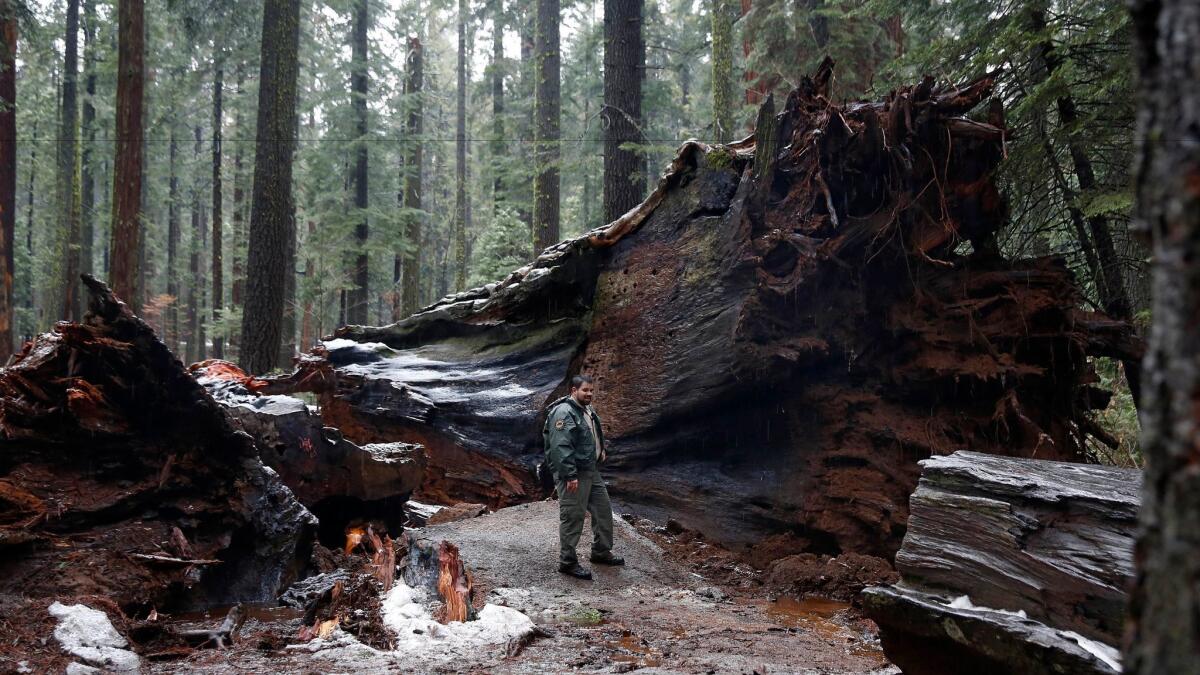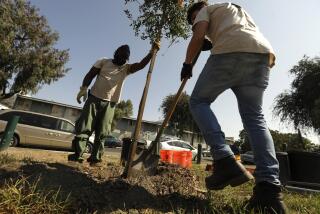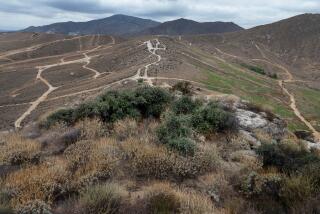An iconic California tree becomes a casualty of this week’s storm
- Share via
The owner of the Mammoth Grove Hotel built his business in the heart of the Calaveras North Grove, where he hoped to attract wealthy Bay Area travelers to a forest full of majestic trees.
But by the late 1800s, giant-sequoia tourism was heating up, and entrepreneurs were looking for an edge. One of the hotel’s competitors even carved a tunnel through a tree in Yosemite National Park, an innovation that proved a hit.
So the landowner decided to cut a hole through his own tree, settling on one with a 33-foot-wide base that already had a burn scar. It was an effective move.
In the roughly 130 years since it was hollowed out, the so-called Pioneer Cabin Tree has taken on iconic status in a state filled with famous trees. Thousands of visitors have walked, ridden carriages and driven cars through the almost 2,000-year-old tunnel tree.
At least, that is, until Sunday. A massive storm that wreaked havoc on Northern California pounded the area with 8 inches of rain, 6 inches of snow and gusty winds. By Sunday afternoon, the towering tree fell into a river of mud — apparently without much of a sound.
“I came around the bend, braced myself, and then I just stopped. I’m sure my mouth dropped open,” said Jim Allday, a docent at Calaveras Big Trees State Park, who was among the first to see the downed tree. “Even though I knew what I was going to be seeing, it was shocking.”
The base of the tree and many of its shallow roots had been yanked out, said Allday, 72. The tunnel was no longer visible; the tree had crumbled.
“It wasn’t a tree,” Allday said. “It was ... splintered wood.”
Officials quickly closed the 1.5-mile loop that sent people to the tree, said Tony Tealdi, supervising ranger with California State Parks.
The plan is “to leave the tree in its resting place,” Tealdi said Monday. “Environmental scientists are out there right now, figuring out where to move the trail … so people can come out and give a proper memorial to the tree.”
Early indications suggest that whenever the path is reopened, there will be no shortage of mourners. A Facebook post announcing that the Pioneer Cabin Tree had fallen had been shared more than 17,000 times and had elicited more than 2,500 comments by Monday evening.
Fans of the tree posted photos of themselves smiling beneath its giant gap. Many fondly recalled childhood moments of a parent driving them through the tunnel. Some bemoaned the fact that they would not be able to share similar memories with their own kids.
“Went to Big Trees [State Park] so many times in my youth, so glad I was able to get a few of my kids back to see these amazing giants and now sad my younger ones will never get to walk through this one,” wrote Jennie Lyn Soper, who added tearful emojis to her comment.
“It sucks,” said Stephanie Adams, a 25-year-old Modesto nursing student who said she visited the tree for the first time just last week. “I definitely wanted to go back.”
Still others said they were just grateful to have seen the tree before it fell.
“When you’re standing underneath it, you can feel how wide it is in a way that you don’t when you’re walking around it,” said Lucas Gruber, a 28-year-old digital designer in San Francisco. “You’re not going to be able to ever experience something like that in our lifetimes.”
Allday said there are only a few “tunnel trees” remaining in California. Yosemite’s Wawona Tree failed in the late 1960s during a severe winter. The National Park Service blames heavy snow, wet soil and the tree’s tunnel for its demise.

On Monday, officials did not pinpoint what caused the Pioneer Cabin Tree to splinter, but Tealdi said the huge cut in the tree has long affected its ability to support its own growth and reduced its ability to resist fire.
Allday said the tree was “almost dead — 99%.” It had just one branch left with a tuft of green on it, and it had taken on an alarming lean. When the wet weather had turned the soil to mud, the tree’s shallow roots could more easily wiggle free.
“People would joke, ‘When is it going to fall? Maybe 100 years, maybe tomorrow,’ ” Allday said.
The docent, who lives just three miles outside the park, estimates he’s walked past the Pioneer Cabin Tree hundreds of times. He’s watched people get married under it on summer weekends and shown fascinated tourists the names and dates that were carved into the tree with kitchen knives more than a century ago.
Photos from that period appear to show fascinated men and women in straw hats and sun hats peering up into the tree’s vast infrastructure. No less a naturalist than John Muir described the forest of Calaveras Big Trees State Park as “a flowering glade in the very heart of the woods.”
And although a piece of “that history is lost now,” Allday said, it’s not that most visitors have “some great affection for the tree itself.” That’s not why so many say they are sad.
“To most people,” Allday said, the loss of the tree means “the loss of the memories.”
Twitter: @ByMattStevens
ALSO
L.A. needs to borrow millions to cover legal payouts, city report says
‘Hollyweed’ prankster surrenders to LAPD, arrested in trespassing case, police say
Backpage shuts down adult section, citing government pressure and unlawful ‘censorship’ campaign
More to Read
Sign up for Essential California
The most important California stories and recommendations in your inbox every morning.
You may occasionally receive promotional content from the Los Angeles Times.










